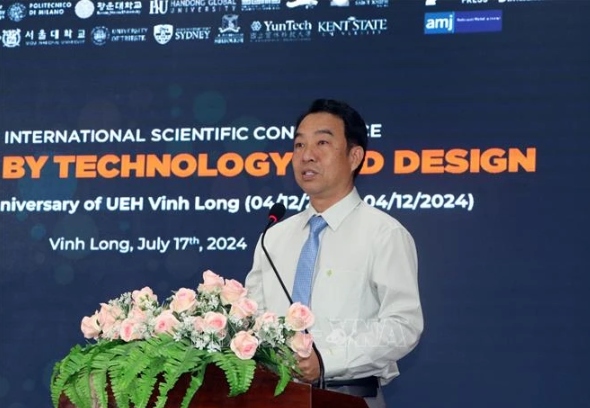International conference seeks solutions for sustainable Mekong Delta
An international conference themed “For a more sustainable Mekong Delta” took place in the Mekong Delta province of Vinh Long on July 17.

Co-hosted by the Vinh Long campus of the University of Economics Ho Chi Minh City (UEH) and prestigious universities from Italy, Australia, the Republic of Korea, Taiwan (China), Singapore, and Japan, the event brought together leading managers and experts at home and abroad to seek solutions to ensuring long-term prosperity in the Mekong Delta.
Chairman of the provincial People's Committee Lu Quang Ngoi said the Mekong Delta comprises Can Tho city and 12 provinces, representing 12% of Vietnam’s landmass and 19% of its population. It holds a strategic position for trade with other ASEAN countries and the Mekong sub-region, boasts advantages in agriculture, food industry, tourism and renewable energy. As Vietnam's largest agricultural production hub, it contributes half of the nation's rice output, 65% of aquaculture farming and 70% of fruit production, while also supplying 95% of rice exports and 60% of exported fish.
Last year, its economic growth hit 6.37%, making it the second highest among the six regions nationwide. The per capita income increased 1.6 times compared to 2020, reaching VND72.3 million (US$3,000).
Despite its economic prowess, the Mekong Delta is not without its challenges. Prof. Su Dinh Thanh, Director of UEH, acknowledged the region's vulnerability to climate change, environmental pollution, land subsidence, riverbank erosion, inadequate infrastructure development, and declining biodiversity.
The event provided a chance to access advanced methods, technologies, and the latest strategies aimed at conserving natural resources, promoting sustainable development and improving the lives of local communities, facilitated by leading experts in related fields, he said.
Discussions at the event covered digital transformation for sustainable development, the role of artificial intelligence in sustainable education, start-up and innovation in the digital age, socio-ecological transition for the Mekong Delta, nature-based solutions for sustainable coastal cities, building sustainable food systems, programming research in agriculture, and sustainable energy solutions.


